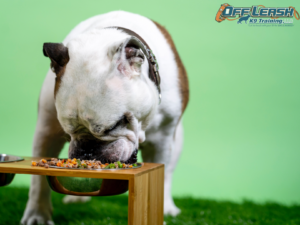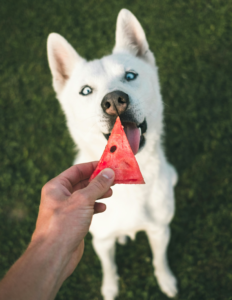Enhancing Your Dogs Health: A Guide to Adding Fresh Fruits and Vegetables
Learn how to safely add fresh fruits and vegetables to your dogs diet to enhance their overall health and well-being.
Introduction to the Importance of Fresh Fruits and Vegetables in a Dog’s Diet
Incorporating fresh fruits and vegetables into your dog’s diet is a key step towards ensuring their optimal health and longevity. These natural foods are brimming with vital nutrients, including vitamins, minerals, and antioxidants, which are essential for bolstering a dog’s immune system and supporting healthy digestion. This addition not only enriches their overall diet but also introduces a delightful variety that can enhance their eating experience. Just as a diverse and balanced diet contributes to human health, the same principles apply to our furry friends. Ensuring a diet that includes a range of fresh fruits and vegetables is fundamental in maintaining a dog’s health, promoting their well-being, and potentially extending their lifespan.
The benefits of such a diet are multifaceted, providing not just nutritional value but also aiding in the prevention of chronic diseases and obesity, a common concern in pets today. These foods offer low-calorie options filled with fiber, which can help in managing a dog’s weight while keeping them satiated. Moreover, the introduction of fresh produce into a dog’s diet can aid in the natural cleansing of their system, thanks to the high water content and fiber in many fruits and vegetables. This balanced approach to nutrition is essential for keeping our canine companions vibrant, happy, and healthy for years to come.
Safe Fruits and Vegetables for Dogs
 Fruits
Fruits
Not all fruits are created equal when it comes to dog-friendly options. Blueberries are an excellent choice due to their low-calorie content and high levels of antioxidants, which can help protect your dog against diseases. Watermelon is another safe option, provided it’s served in moderation and without seeds or rind, offering hydration and essential nutrients. Cranberries, although less commonly given, have been recognized for their potential benefits in preventing urinary tract infections in dogs, making them a valuable addition when used appropriately.
Vegetables
Vegetables also offer a variety of safe and nutritious options for dogs. Spinach, packed with iron and other vital nutrients, can be a healthy addition to your dog’s diet when cooked and served in moderation to avoid potential oxalate issues. Sweet potatoes are not only delicious but also provide a good source of dietary fiber, vitamins, and minerals, supporting digestive health. Green beans, whether fresh, steamed, or canned (without added salt), can be a low-calorie snack full of important vitamins and minerals.
Fruits and Vegetables to Avoid
It’s crucial to remember that not all fruits and vegetables are beneficial for our canine companions. Certain types can be harmful and should be strictly avoided to prevent health complications. Grapes and raisins are particularly notorious for their toxicity in dogs, capable of inducing kidney failure, a condition that can be life-threatening without prompt treatment. Similarly, onions, often staples in human cuisine, contain substances that can lead to anemia by damaging red blood cells in dogs. These effects can occur whether these foods are consumed raw or cooked, making it imperative to keep such ingredients out of reach.
With the well-being of our dogs in mind, it’s essential to be vigilant and informed about the foods we choose to share with them. By avoiding these toxic foods, we can ensure that our furry friends enjoy a healthy, balanced diet that supports their overall health and happiness.
 Preparing Fresh Fruits and Vegetables for Dogs
Preparing Fresh Fruits and Vegetables for Dogs
Introducing fresh fruits and vegetables into your dog’s diet involves more than simply adding raw pieces to their meal. The correct preparation can make these healthy snacks both safe and appealing to your furry friend. For instance, carrots, known for their crunch and nutritional benefits, can be lightly steamed or boiled to make them easier for dogs to chew and digest. This gentle cooking process helps to retain the essential nutrients while ensuring the carrots are safe and enjoyable for your dog to consume. Similarly, apples, a popular choice among pet owners for their vitamin content and fiber, must be prepared with care; removing the seeds is crucial as they contain cyanide, which can be harmful to dogs. Offering slices of apple can provide a refreshing and hydrating snack, especially on warm days.
In addition to these, frozen blueberries offer a unique option for both hydration and training rewards. These small, nutrient-packed fruits are ideal for summer treats. They can be easily frozen to provide a cooling effect, helping to keep your dog hydrated during the hotter months. Moreover, blueberries’ small size and delicious taste make them excellent as low-calorie training treats. Incorporating these fruits into training sessions can enhance the experience for your dog, making learning new commands more enjoyable. Always remember to introduce any new food slowly into your dog’s diet to monitor for any adverse reactions and consult with a veterinarian to ensure these additions meet your dog’s nutritional needs. For more insights on integrating nutritious snacks into your dog’s training regimen, consider exploring the resources at Off Leash K9 Training of Corpus Christi, where experts can guide you on balanced diet practices for optimal canine health and behavior.
Health Benefits, Nutritional Value, and Portion Control
Incorporating fresh fruits and vegetables into your dog’s diet can significantly enhance their health and vitality. These natural foods are packed with essential vitamins, minerals, and antioxidants that support various aspects of canine health. For instance, carrots not only offer a crunchy, enjoyable snack but are also rich in beta-carotene, promoting healthy vision and immune system functionality. Similarly, leafy greens like kale are nutrient-dense, supplying key vitamins and minerals such as calcium, which is vital for maintaining strong bones and teeth.
However, while the benefits of adding these fresh foods to your dog’s diet are clear, it’s crucial to approach portion control with care. Dogs have different nutritional requirements than humans, and what constitutes a healthy addition for one dog might not be suitable for another. Overfeeding fruits and vegetables can lead to digestive issues and may upset the balance of their diet. Experts recommend that these fresh foods should not exceed 10% of a dog’s daily calorie intake to ensure they receive a balanced diet while still enjoying the health benefits of fresh produce. By adhering to these guidelines, you can provide your dog with a varied diet that supports their health without compromising their nutritional balance.
Incorporating Fresh Fruits and Vegetables into Your Dog’s Training
Incorporating fresh fruits and vegetables into your dog’s training can be a game-changer for both their health and behavior. These natural snacks serve as excellent low-calorie rewards, perfect for reinforcing positive behavior without the added guilt of overfeeding. At Off Leash K9 Training of Corpus Christi, we emphasize the value of using nutritious treats like blueberries or sliced carrots during training sessions. Not only do these treats support a healthy diet, but they also keep your dog eager and attentive, making training more effective and enjoyable.
Moreover, integrating fresh produce into your dog’s training regimen offers a unique opportunity to enhance their dietary variety while keeping their minds sharp and focused. For more details on incorporating nutritious treats into your dog’s training and to discover the full range of services offered, visit us at Off Leash K9 Training of Corpus Christi.
Conclusion: Ensuring a Healthy and Balanced Diet for Your Dog
Ensuring your furry companion enjoys a long, happy, and healthy life starts with what you put in their bowl. Integrating fresh fruits and vegetables into your dog’s diet can significantly contribute to their overall well-being, providing essential nutrients, vitamins, and minerals that support everything from their immune system to their digestive health. However, understanding that not all fruits and vegetables are safe for dogs is crucial, and moderation is key to avoid any digestive upset.
For those looking to dive deeper into optimizing their dog’s diet or seeking expert advice on how to use nutrition as a part of a comprehensive training and behavioral strategy, Off Leash K9 Training of Corpus Christi offers a wealth of resources and services. Their team of professionals understands the unique bond between dogs and their owners and how a well-rounded diet can significantly impact a dog’s behavior and training receptivity.


 Fruits
Fruits Preparing Fresh Fruits and Vegetables for Dogs
Preparing Fresh Fruits and Vegetables for Dogs





